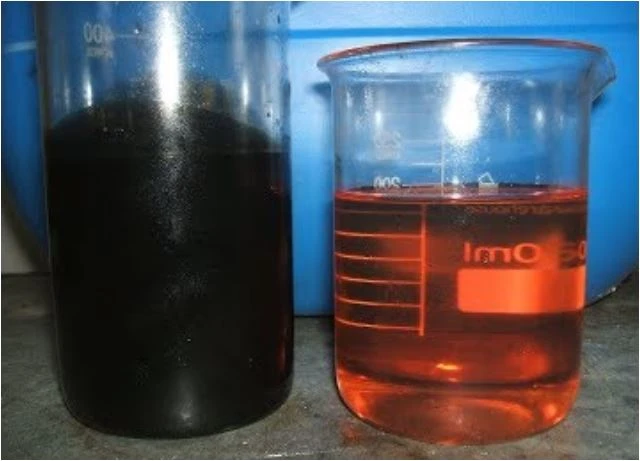Black diesel fuel problems are often a result of contamination and degradation over time. The presence of impurities or a breakdown of the fuel can lead to darkening, which in turn causes issues for the engine and the vehicle as a whole.
Diesel fuel can turn black due to several reasons, including microbial growth, oxidation, and the presence of soot particles. Microorganisms like bacteria and fungi can grow in diesel fuel, producing waste products that darken the fuel. Oxidation occurs when the fuel is exposed to air, causing it to break down and change color.
Soot particles from incomplete combustion can also mix with the diesel fuel and turn it black. Dark diesel fuel can cause problems such as clogged fuel filters, reduced engine performance, and increased emissions.
It is essential to store diesel fuel properly and maintain the fuel system regularly to avoid these problems. Regular fuel testing and using fuel stabilizers can also help in maintaining the fuel quality and preventing it from turning black.
what causes diesel fuel to turn black & fixes
Black diesel fuel is a common issue that many diesel engine owners face. It is crucial to recognize the various causes behind this problem and the corresponding solutions to address it effectively.
1. Microbial Growth
Microorganisms, such as bacteria and fungi, thrive in environments where water is present. Diesel fuel systems can accumulate water, providing a suitable habitat for these microorganisms. Their growth and multiplication lead to the production of waste products, which darken the fuel.
To counter this issue, it is essential to regularly remove water from the fuel system and use biocides that are specifically designed to kill microbes in diesel fuel. Regularly changing fuel filters can also help in removing microbial contamination from the fuel.
2. Oxidation
Exposure to air can cause diesel fuel to oxidize, which leads to the formation of gum and varnish that darken the fuel. This can happen during storage or if the fuel system is not properly sealed.
To prevent oxidation, it is necessary to store diesel fuel in airtight containers and regularly check the fuel system for leaks. Using antioxidants can also help in slowing down the oxidation process.
3. Soot Contamination
Incomplete combustion in the engine can lead to the formation of soot particles. These particles can mix with the diesel fuel in the fuel system and turn it black.
Ensuring proper combustion by regularly maintaining and tuning the engine can help in minimizing soot production. Using high-quality fuel with lower sulfur content can also reduce soot formation.
4. Contamination with Engine Oil
Engine oil can sometimes leak into the diesel fuel system and mix with the fuel, causing it to turn black. This can happen due to faulty seals or gaskets. It is necessary to regularly check and replace any worn-out seals or gaskets in the engine and the fuel system.
Regular oil changes and using high-quality engine oil can also help in minimizing this issue.
5. Use of Adulterated Fuel
Adulterated fuel often contains impurities that can darken the fuel. It is crucial to purchase diesel fuel from reliable and trusted sources to avoid contamination.

Symptoms of Bad Diesel Fuel
The quality of diesel fuel plays a crucial role in the performance of a diesel engine. Bad or contaminated diesel fuel can lead to several issues that can affect the overall performance and efficiency of the engine.
Some common symptoms of bad diesel fuel include reduced engine power, increased fuel consumption, difficulty in starting the engine, frequent stalling, and increased smoke emissions.
The presence of contaminants like water, microbial growth, and particulate matter in the fuel can lead to clogging of fuel filters and injectors, causing erratic engine operation.
Oxidation of the fuel can cause the formation of gum and varnish, which can lead to deposit build-up in the fuel system and engine components. This can result in poor fuel atomization, incomplete combustion, and increased emissions.
It is essential to be vigilant about these symptoms and address them promptly to avoid costly repairs and downtime. Regular fuel testing, using fuel stabilizers, and maintaining proper storage conditions can help in preventing diesel fuel from going bad.
Maintaining Tips
Proper maintenance of diesel fuel and the fuel system is essential to ensure optimal performance and longevity of the diesel engine. Here are some maintenance tips that can help in preventing black diesel fuel problems:
1. Regular Fuel Testing: Regularly test the fuel for the presence of water, microbial contamination, and particulate matter. This will help in identifying any issues early and taking corrective action.
2. Use Fuel Stabilizers: Fuel stabilizers help prevent oxidation of the fuel and the formation of gum and varnish. They also help in maintaining fuel quality during storage.
3. Regularly Change Fuel Filters: Fuel filters help in removing contaminants from the fuel. It is essential to change them regularly to ensure optimal fuel filtration.
4. Proper Storage: Store diesel fuel in airtight containers and in a cool, dry place to prevent contamination with water and microbial growth.
5. Regular Engine Maintenance: Regularly maintaining and tuning the engine can help ensure proper combustion and minimize soot production.
6. Use High-Quality Fuel: Always use high-quality diesel fuel with lower sulfur content to reduce soot formation and emissions.
Learn More: Burning Diesel In A Kerosene Torpedo Heater! What You Need To Know
